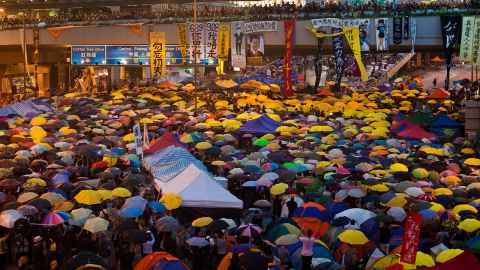Hong Kong’s protests: Cause for celebration?
25 June 2019
Opinion: Unprecedented mass protest in Hong Kong brought suspension of a proposed extradition law but not withdrawal. So is it a victory? Stephen Noakes explains.

Over the past 10 days, mass demonstrations in Hong Kong have been hailed in international media as triumph for the demonstrators, for civil liberties, and for the democracy they stood up to protect. But is this victory really all it seems?
The protests began on June 14 over popular dissatisfaction with the proposed extradition law, which aimed to facilitate a swifter, smoother passage of prisoners from the Hong Kong Special Autonomous Region to the People’s Republic of China. Chief Executive Carrie Lam and other supporters of the bill had framed it as essential to ensure Hong Kong does not become a safe-haven for criminals, and thus remains a prosperous stable safe place to do business, free from the influence of corruption.
On the other hand, critics of the bill worried that more lax extradition regulations would mean some Beijing’s most outspoken opponents could be more easily sent to the mainland and tried under PRC law. For them, the extradition bill is simply the latest in a string of political manoeuvres that chip away at the “one country, two systems” approach that was to protect Hong Kong’s UK-inspired legal tradition following retrocession to Chinese to sovereignty in 1997.
Back in 2014, protesters took to the streets over plans to alter universal suffrage laws in a manner that would all but guarantee only pro-Beijing candidates could reach the office of Chief Executive. Also known to global media as the Umbrella Revolution, the movement seized upon international name recognition, coining itself “Occupy Central with Love and Peace.”
The recent protests are distinct from Occupy in a number of ways. For one thing, they are reported to have been larger. Even though Occupy Central ground Hong Kong to a halt for a total of 77 days, a record two million people are thought to have demonstrated against the extradition bill last Sunday. The sheer size of the crowd suggests the current issue may have greater currency in the lives of Hong Kong’s 7.4 million residents.
While Occupy failed to bring any political concessions, the sentiment in 2014 was that the lives and lifestyles of most Hong Kongers would not be affected by changes to the electoral formula. By contrast, the anti-extradition protest has been framed explicitly as an attack on civil liberties by proxy from Beijing (traditionally, Hong Kong’s pro-Beijing camp has been most closely aligned with the Shanghai faction of the Communist Party).
...protesters in Hong Kong today still face a nearly impossible uphill battle, much like the Occupy movement of five years ago.
Under these conditions, many more Hong Kong residents feel the only option is to block the extradition bill through grassroots action on an unprecedented scale. For this reason, Carrie Lam’s announcement that the bill had been “suspended” met with profound jubilation.
Yet protesters in Hong Kong today still face a nearly impossible uphill battle, much like the Occupy movement of five years ago.
It is significant that passage of the bill was merely “suspended” rather than “withdrawn.” Suspension accomplishes two things. First, it allows those in favour of the bill to wait until public pressure and international attention has subsided, while leaving open the possibility of reintroducing the legislation later. In choosing to suspend the bill, Lam and her allies are banking on being able to wait out the protesters, and on the exigencies of 24-hour news cycles dragging focus away from the current quagmire to other issues. Second, suspension of the bill allows Beijing to distance itself from recent events. Lam has been portrayed in recent days as acting of her own accord, rather than as an agent of Beijing. This creates the impression that the issue is a local one which matters to Hong Kong, rather than a national one pitting the PRC against Hong Kong, or worse, an instance of mass outrage and revolt against Communist Party.
Additionally, time bought through suspension of the bill gives the pro-Beijing/pro-extradition camp a chance to attempt to dismantle the movement—details of which have emerged in the last several days. For example, the South China Morning Post reports a dramatically increased police presence in Hong Kong hospitals—part of an ongoing search for protestors among those injured in last weekend’s demonstrations—that includes harassment of medical staff. The reports are nothing surprising given reports in Al Jazeera and the BCC that the protestors continue to gather support from a range of religious leaders and dissidents in China and around the world.
Yet Beijing and its supporters have a willingness and capacity to respond forcefully to the challenges of dissidents and religious leaders, and have done so on many past occasions, including those seldom reported in China or around the world.
The PRC’s coercive capability is real. Hong Kong protesters must make their decisions to fight on (or not) with clear-eyed knowledge of that reality. For the rest of us, it’s important that we applaud their principled commitment, especially because their victory is so unlikely.
Dr Stephen Noakes is a senior lecturer in Politics and International Relations in the Faculty of Arts. He specialises in contemporary Chinese politics and foreign policy.
This article reflects the opinion of the author and not necessarily the views of the University of Auckland.
Used with permission from Newsroom Hong Kong’s protests: Cause for celebration? on 25 June 2019.